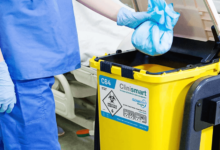What to Expect During Hernia Surgery: A Step-by-Step Guide

A hernia is a bulge forming when the organs or tissue push through the opening or a weak spot of the nearby muscle walls. This condition has become relatively common because of several reasons, including unhealthy lifestyle choices, family history, injury, any other medical condition, etc. Most hernias form in the abdominal wall or groin area; however, the location may be different for some people.
Although a hernia is not alarming, it may become painful and grow over time. As a result, you may feel discomfort and pain, especially when carrying out daily activities like running errands, walking, exercising, or more. If your hernia becomes painful over time and intrudes on your daily activities, you may be advised surgery by the doctor. Generally, surgery constitutes the last resort for this condition and is recommended when all the alternatives to it do not work in your favour.
When Does a Doctor Advise A Hernia Surgery?
A hernia surgery helps push the organ or tissue back to its original location and repairs the opening or weak spot in the muscle. Sudden and severe pain in the hernia or tenderness is the first warning sign. The doctor may advise hernia surgery in the following cases:
- A bulge that doesn’t go back inside the abdomen as it once did
- A bulge, which is larger
- Bloating or fever because of the hernia
- Nausea or vomiting because of the hernia
- Redness on the location of the hernia
What to Expect During Hernia Surgery?
Before the surgery, the doctor will carry out a physical examination. You may need tests to see if you are healthy enough for the surgery and anaesthesia. Some clinics will send you pre-op instructions to help you prepare better for the surgery. These instructions include the following:
- If you are taking certain drugs during the morning of your surgery, take them with only one sip of water.
- Inform your doctor about the medication you have been on.
- The exact time to stop eating or drinking before the surgery.
- The exact time to stop smoking before the surgery. The doctor suggests stopping smoking before 4-6 of the surgery to improve the outcomes.
- When do you take a shower, and do you need antibiotic soap?
FOR INFORMATIVE CONTENT VISIT.. : Christmas gifts
What to Expect During Hernia Surgery?
The surgery starts with administering some form of sedation, mostly anaesthesia, so you don’t feel any pain or discomfort during the surgery. The surgery includes the following:
- The surgeon will push back the bulging tissue to its original location.
- They will repair the weak spot or opening in the muscle.
- They will use a surgical mesh to strengthen and cover the defect caused by hernia in some cases.
They can choose from the two methods for hernia repair surgery – open surgery or laparoscopic/robotic surgery.
Open Hernia Surgery
Open surgery is recommended if the size of your hernia is large. In this procedure, the surgeon makes a long cut in your groin or abdomen to see and repair the hernia. Whether you need a surgical mesh or not is decided ahead of time. The mesh keeps a hernia from forming on the same spot again.
This surgery may require longer recovery time, and the doctor will give you some post-op instructions that you must take seriously for better recovery.
Minimally Invasive Hernia Surgery
Under this procedure, the surgeon makes small incisions in the body and allows a tiny camera, known as a laparoscope, to see the hernia. Using special tools and other tubes, they cut and repair the hernia.
This surgery doesn’t lead to immense pain or bleeding. The recovery is relatively quicker and smoother.
What Happens After Hernia Surgery?
Some hernia surgeries are outpatient procedures and you can go home the same day. You may need to stay in the hospital if you have problems or if the size of your hernia is large. The pain level with both types of surgery is the same for the first 72 hours of the operation. In some cases, open surgeries may feel a little more painful.
The surgeon will give you some over-the-counter drugs like ibuprofen or acetaminophen to manage pain if the hernia is small or in the groin. Most people have less pain after minimally invasive hernia surgery. Before you head home, your care team will give you some care instructions. If the hernia is large, you may require a small drainage tube for a short while after the surgery.
Recovery after surgery can vary from person to person, as everyone’s body is unique. Factors such as the size and type of the hernia, your age, and overall health also characterise recovery. Follow the post-op instructions and take the follow-up appointments with your doctor seriously. You may be able to resume light activities within a few days after the operation. Do not lift heavy weights after the surgery.
Takeaway
Hernia surgery has a high success rate and is often followed by post-operative instructions that you must take seriously to recover at the right time.





